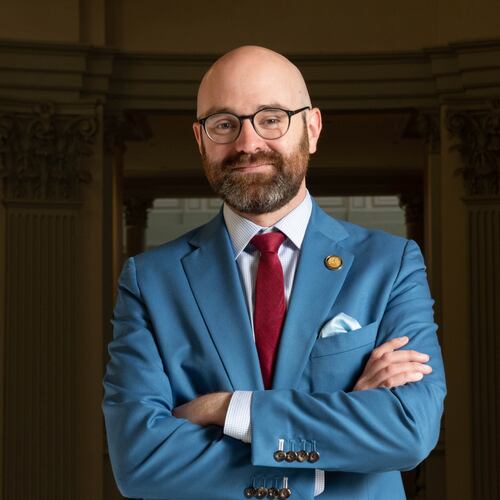The brutal civil war in Syria claimed the life of Ahmed’s father, terrorized his family and friends and ground his neighborhood near Homs to rubble.
Ahmed — a Sunni Muslim who asked that his full name not be used to protect his remaining relatives in Syria — said he fled to Jordan in 2012 after militiamen aligned with Syrian President Bashar Al-Assad wrongfully accused him of attacking them.
Ahmed, his wife and three young children arrived in Atlanta last weekend, the first Syrian refugees to resettle in Georgia since the uprising against the Assad regime began more than three years ago. He spoke about his family’s odyssey Wednesday through an Arabic interpreter at the Atlanta office of the International Rescue Committee, which is helping his family resettle in Clarkston.
“I don’t have any positive hope for Syria, even if Bashar Al-Assad will go,” said Ahmed, 30, a bearded man who looks older than his age. “There are so many parties fighting and everything is destroyed.”
More than 162,000 people have been killed in the Syrian conflict so far, according to the Syrian Observatory for Human Rights, based in England. Millions of others have been displaced by the war, a United Nations report shows.
The International Rescue Committee has been calling on the federal government to welcome 12,000 Syrian refugees this year, plus 3,000 more next year. Only about 100 had been resettled in the U.S. as of February. But the Obama administration is expecting to begin receiving thousands of referrals from the United Nations this year to resettle Syrians in the U.S. Most are expected to begin arriving during the next two years.
The federal government provides refugees with funding that partially covers the cost of rent, furniture, food and clothing. Private contributions supplement that funding. Refugees may work in the U.S. And they are required to apply for permanent residency after a year and are eligible to apply for U.S. citizenship after five years.
Ahmed said he grew up in the Homs area and worked as a carpenter there until the war made it impossible for him to support his family. After bombs flattened his neighborhood his family fled to the Damascus area, where there was more violence. He said his children still suffer from flashbacks.
“There are a lot of bombs and missiles going over there,” he said. “Homs and the village where we lived — it’s a small village — everything is destroyed.”
Ahmed described pro-Assad militiamen rounding up people in his neighborhood and taking them away. Last year, he said, the Syrian Army kidnapped his father — a taxi driver — at a checkpoint, bound his hands, beat him and shot him twice in the head.
Ahmed found allies to smuggle his family across the border to Jordan, where they scraped by for two years before the United Nations helped them come to the U.S. Anxious about finding a job and an Arabic community to blend in with here, he hopes his young sons and daughter will learn English and that he will eventually be able to buy a home in the U.S.
“I’m very happy — me and my family — that we left all these bad days, the violence, the executions, the killings,” he said. “Now I feel safe.”
About the Author
Keep Reading
The Latest
Featured



